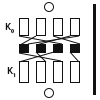CYBV329
Cyber Law, Ethics, and Policy
Course Description
CYBV329 consists of a sustained study of ethical and legal issues that arise in relation to employment in the public and private sectors, including allocation of resources, corporate and social responsibility, relationships, and discrimination. A main focus of this course will be on the ethical and legal standards governing information technology. New technology creates ethical challenges for individuals around the globe, and applies to most persons regardless of whether they are employed in the information technology field or a more traditional occupation. The study of Cyber Ethics provides a framework for making ethical decisions that professionals are likely to encounter in the workplace. This course will not only focus on ethics but on the legal, economic, social, cultural and global impacts of decisions that are made in the context of professional occupations. CYBV329 meets the National Security Agency (NSA) Center of Academic Excellence in Cyber Operations (CAE-CO) academic requirements for Cyber Law and Ethics.
Learning Outcomes
The student will:
- Demonstrate an understanding of how ethical issues affect individuals, communities and societies and be able to analyze the consequences of various professional ethical dilemmas.
- Demonstrate awareness and understanding of what is morally/ethically at stake in various situations.
- Apply moral principles and standards of behavior in a workplace setting.
- Identify concepts such as ethics, morals, character, ethical principles and ethical relativism.
- Demonstrate an understanding of the importance of ethical issues that emerge from the widespread use of information technology.
- Identify appropriate and ethical behaviors, legal standards, rights, restrictions, and moral duties when accessing technology systems, digital media, and information technology within the context of today’s society.
- Apply an ethical decision-making process when confronted with ethical dilemmas.
- Demonstrate an understanding of the ethical issues associated with confidentiality and privacy as they relate to information technology.
- Given a cyber operations scenario, students will be able to explain the authorities applicable to the scenario.
- Provide a high-level explanation of the legal issues governing the authorized conduct of cyber operations and the use of related tools, techniques, technology and data.
- Evaluate the relationship between ethics and law, describe civil disobedience and its relation to ethical hacking, describe criminal penalties related to unethical hacking, and apply the notion of “grey areas” to describe situations where law has not yet caught up to technological innovation.
- Describe steps for carrying out ethical penetration testing, describe ethical hacking principles and conditions, distinguish between ethical and unethical hacking, and distinguish between nuisance hacking, activist hacking, criminal hacking, and acts of war.
- Identify organizations, laws and regulations related to computer ethics, law, and policy.
- Demonstrate investigative and analytical thinking skills by examining alternatives, exploring complex questions and solving challenging problems.



 Cyberapolis
Cyberapolis Curriculum
Curriculum Career
Career Faculty
Faculty